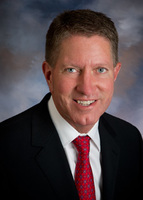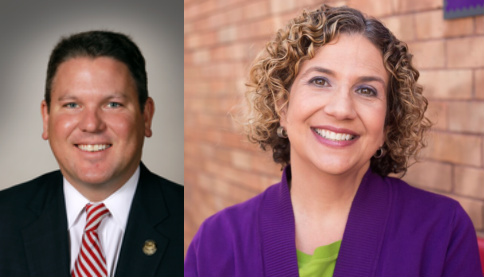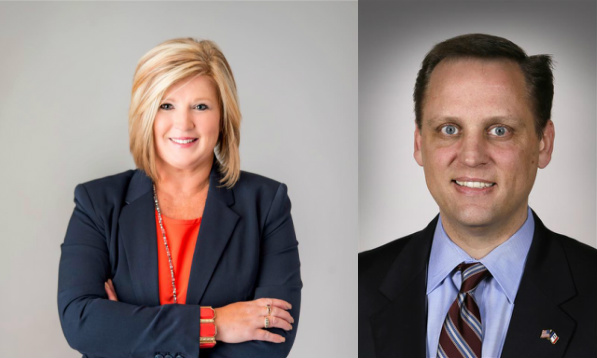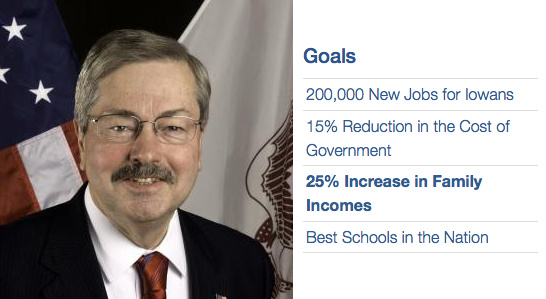Happy Labor Day, Bleeding Heartland readers! If you are enjoying a three-day weekend, thank the labor activists from past generations who made it possible. In fact, go ahead and thank the organized labor movement for every weekend off.
The Iowa Policy Project’s latest report on the Cost of Living in Iowa found that “Nearly 114,000 Iowa families”–close to 19 percent of the state’s working households–“do not earn enough to provide for a basic standard of living without public supports, despite one or more full-time wage earners in the family.” Part 1 estimates how much a family needs to get by in Iowa, taking into account expenses for “rent, utilities, food prepared at home, child care, health care, transportation, clothing and other household necessities,” but not “savings, loan payments, education expenses, any entertainment or vacation, social or recreational travel, or meals outside the home.” Part 2 explores how many Iowa families aren’t earning enough to cover essentials, and shows that “rural regions have substantially higher shares of working families with incomes below self-sufficiency.”
For political junkies, Labor Day kicks off the most intense phase of the general election campaign. Candidates at all levels can use help identifying supporters and getting them signed up to vote early. Direct voter contacts are particularly important for state legislative races. I highly recommend Laura Hubka’s 15 tips for volunteers knocking on doors. Two years ago, I posted my own canvassing dos and don’ts.
One of my funniest door-knocking experiences happened on this day last year. I was canvassing in Beaverdale for Des Moines school board candidate Heather Anderson. Normally I would not be out on a holiday, but the school board election was scheduled for September 8, the day after Labor Day. One house on my walk list already had a Heather Anderson sign in the yard. I decided to knock anyway, in case the supporter needed extra literature to give to friends and neighbors, or a reminder about the polling place location and opening hours. During our conversation, the voter said, “You know who else is for Heather? Bleeding Heartland. She’s on our side.” Yeah, I heard that…
Hillary Clinton is scheduled to appear at the Quad Cities Labor picnic later today. I’ll update later with a few links. I enclose below a video her campaign released this week featuring Ruline Steininger, a 103-year-old supporter in Des Moines. Echoing what I’ve heard from many women including former Lieutenant Governor Patty Judge and my mother-in-law, Steininger commented that when she was in high school, the only career options were to become a teacher or a nurse. She views Clinton as “more prepared” than anyone has ever been for the presidency, and also thinks her election would let “little girls know that you can be anything you want to be in this country. People won’t have to wonder whether they’re going to be a school teacher or a nurse. The sky’s the limit now. You can be president.”
I only knew one of my grandparents well. Although I didn’t get many chances to talk politics with my grandmother, I’m confident that if she were still alive, she also would be voting for Clinton. Having been active in the Sioux City Maternal Women’s Health League (later a founding organization in Planned Parenthood of Greater Iowa) during the 1940s, she probably would not need to hear more than “defund Planned Parenthood” to turn her off voting for any Republican.
Lisa Desjardins and Daniel Bush reported for National Public Radio this week on the Donald Trump campaign’s “jaw-dropping gap in the ground game.” Clinton has “more than three times the number” of field offices in battleground states. In Iowa, Democrats have at least 25 “coordinated campaign” offices open around the state, possibly more by now. Trump and the Republican Party of Iowa have nine offices open, according to NPR’s data.
Speaking of jaw-dropping: Trump’s volunteers, including those participating online, are being asked to sign an absurdly broad and in some places illegal “non disclosure form.” Among other things, the volunteer must promise not to “demean or disparage” the Trump campaign or any member of Trump’s family or any Trump business, “during the time of your service and at all times thereafter.” Attorneys tell me this document probably would not be enforceable because of legal flaws such as lack of consideration. The illegal part: requiring volunteers to promise that none of their employees will volunteer for Clinton.
Thanks to all the readers whose accounts informed Thursday’s post on Republican message-testing in key Iowa House races. Democratic State Representative Todd Prichard posted on Facebook that his wife was a respondent on one of these calls. Good news: she’s still voting for him, even after hearing all the awful things he supposedly did. I am seeking details about similar telephone surveys that may be ongoing in battleground Iowa Senate districts. My e-mail address is near the lower right corner of this screen.
Continue Reading...























